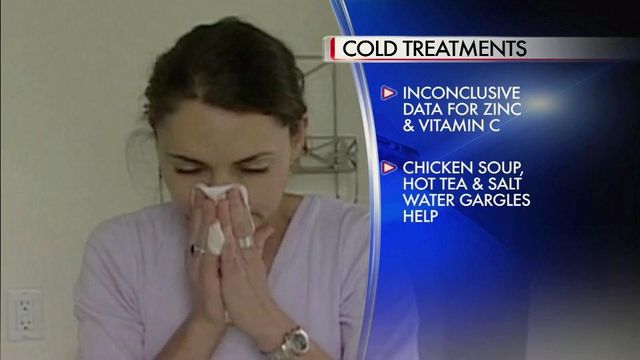Flu or cold? Fever is the key
A lot of people are calling in sick with a fever, runny nose and cough but it can be hard to tell whether an illness is the flu or the common cold.
Posted — UpdatedWRAL’s Dr. Allen Mask said that he has seen lots of patients with cold symptoms. Experts at UNC said about 10 percent of their emergency room visits are for non-flu upper respiratory cases, including viruses like RSV, parainfluenza and rhinoviruses.
According to the CDC, the flu is “minimal” in North Carolina right now, and experts said the flu vaccine appears to be an excellent match this year. But how can patients tell if they have a cold or the flu?
Typically, a cold causes a sore throat, runny nose and cough. Fever is uncommon in adults, though kids may have one, and symptoms usually last about a week. The flu will make patients a lot sicker. They can have cold symptoms plus a headache, fever and body aches.
Mask said people are more prone to getting sick if they are extremely tired, emotionally distressed or have allergies. People who are indoors a lot and exposed to a lot of other people are also at a higher risk, which is why kids -- who attend schools and day care centers where viruses are easily spread -- get sick more often. Kids get an average of five to seven colds per year.
When it comes to treating cold symptoms, Mask said the data about zinc and vitamin C are inconclusive.
Zinc helps the body to resist infection and repair tissue. It can be found naturally in shellfish, beef, beans and nuts. Taking zinc lozenges may help, but supplements should not be taken for more than five days at a time.
High doses of Vitamin C during a cold may help, but there is inconclusive proof, said Mask.
Chicken soup helps fight colds by soothing the throat, and it is a great form of hydration that builds up the immune system, said Mask. Hot tea is also helpful for soothing sore throats, along with warm salt water gargles.
Antibiotics are not given to treat a cold or the flu, but there are other medications to help patients feel better. Anti-viral medications like Tamiflu can help with the flu and decongestants can help with congestion, but patients need to be careful with these if they have hypertension, said Mask. A Neti pot can also be helpful for getting rid of thick mucus in the nose.
• Credits
Copyright 2024 by Capitol Broadcasting Company. All rights reserved. This material may not be published, broadcast, rewritten or redistributed.





